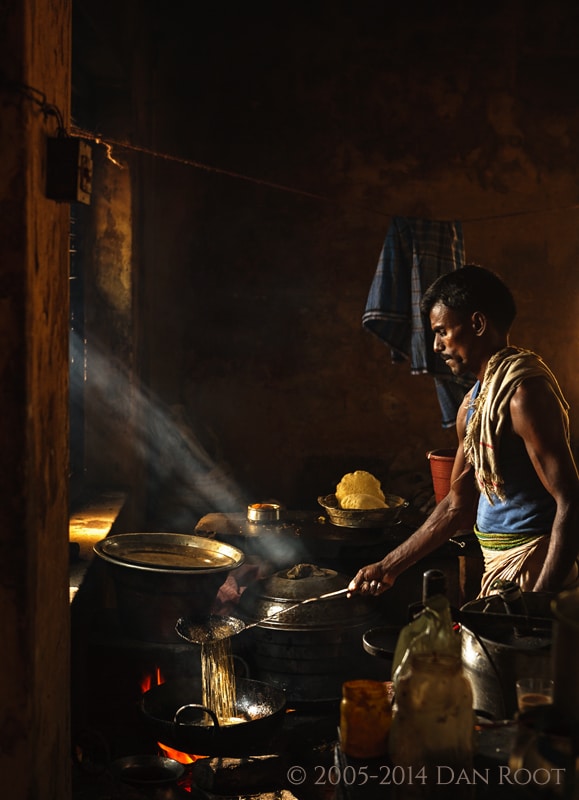No, not that kind of oil. Not cooking oil, although the man in this photo is using plenty of it. I refer to the Rembrandt-like quality of this photograph. I've been looking at this image for ten years. It is one of the most stunning naturally lit, completely undoctored, photographs I have seen in that time, and it has never faded for me. Perhaps because I am intimately involved with how it came to be.
This photograph carries with it profound and poignant meaning beyond the simple act of making poori, beyond its composition, light, and saturated colors, beyond its timelessness. It carries the stories of a quarter million people who perished and hundreds of thousands more left destitute ten years ago in a violent natural cataclysm that devastated the shores of eleven countries.
No doubt you know which event I'm referring to. Its tenth anniversary is coming up this December.

Photo courtesy of Dan Root Photography
PRACTICE
Today I'm sharing this image with you because I'd like you to write a story about it. Or around it. Or with it.
Here below, in the comments, as always.
Once you've had a chance to write your stories, I'll share mine. But only after you, as I don't want to unduly color your perception and interpretation of the image.
If you end up making poori instead of writing a story, be sure to send us some!







It was a beautiful day outside and the time for the famous family banquet has arrived. Guest, party trays, wine and the love of a good home down family would surely brighten things up. The smell of a home cooked meal means more to the soul than anything ever imagined. It was extraordinary as the sun shined through the window of the small, glass that we could all enjoy watching the great outdoors through. The fire was spanking hot, the grease was boiling to outrageous temperatures and the smell of fresh spices made the family worth coming together. There was nothing like the grace of home. It may be small and it might not even be the grace cathedral in England but it reminded me of home. A place where the heart grows fonder and the soul blossoms like a small red rose positioned outside the kitchen window. What more could anyone ask for? not only would I enjoy the favorites of a home cooked meal, but also the love of family, friends and visitors.
Family dinners are wonderful memories. The shared joys of preparing and enjoying a meal with loved ones are priceless indeed. You did a lovely job of incorporating all the senses.
People ask me about the photograph.
Tacked to my bulletin board amid notes, ticket stubs, and other scraps of my life, the photo never fails to catch the eye. And each time they ask, I have to stop. Stop to absorb it all again, the beauty, the simplicity, the pain.
“A friend sent it to me back in 2004,” I’d say, the words so simple, but always so difficult to say. “He was working on assignment in Sri Lanka.”
I wait, and sometimes there is a reaction, a blink, a soft indrawn breath, followed by an equally soft, “I’m sorry.”
However, the reaction comes less and less often as time and events push that nightmare December 2004 farther backward in the collective consciousness of my world, half a planet away from the site of that cataclysmic event. A day when the earth shrugged and over 200,000 souls cried out in terror and were lost. One of them, a quiet brown-eyed poet with a camera; a talented photographer whose amazing skill captured that simple majestic moment. For those losses, for that loss, I keep the photo as a reminder, never farther away an upward glance.
Every day is precious, everyone is magic, and everything is sacred. Live, love, laugh, and remember, always remember.
Stunning and well written. Thank you for sharing your words.
Thank you. Mostly, I thank Birgitte for reminding me to look outside of my own sphere.
Critical for a writer!
Denise, thank you for this deeply touching piece. Indeed, our photographer was on assignment, although this image was taken in India (you were close!!) But you hit it on the nail with your “poet with a camera.” That’s Dan for you. You can see more of his images from that trip here: http://tsunami.lucita.net/photo01.html
I looked at his website for more photos but couldn’t find those. I’ll check out the link. Certainly this and the photos on his website clued me in to the poet in him.
Hi Denise, did you click on the words Thailand and India on the left? That’s how you access all the images and the categories.
Gorgeous!
Simply beautiful is this work of prose. Thank you for this wonderful contribution.
Outside the window the teeming streets of Pahi crowd into the house despite the early hour, the clamor of hawking merchants, the crowds undulating down narrow alleyways, children shreiking, sheeps, goats, and oxen. The streets have their own smells, too, often of rotting meat, spoiled fruit, and animal droppings warmed by a rising sun. In this kitchen, though, the steam of slow-cooking dal, pungent with saffron, mustard seed, and asoefetida, fills my nose and my heart with unspoken joy. Waiting for a pot to boil, I run my hands through the box of rice on the stool, and with its bulk brings a sense of richness and prosperity despite my spare belongings. Many in my small city are less fortunate than I, those who have no dal simmering for their supper, those whose children will go to be hungry yet again, and those who have no hut at all. I am rich beyond measure.
I enjoyed your descriptions and your reminder to appreciate our blessings … so easy to take for granted. Perhaps it would enlarge your piece to include some reference to the disaster to which this photo is connected, the huge losses, death and destruction. Hard for many of us living far away to comprehend.
Thank you for your kind words. I agree with you that the addition of the tragedy accompanying this photo would have deepened the piece. I’ll work on it.
This is a stunning photo. It looks so much like an oil painting I find it difficult to believe that it is a photo.
Here is my practice as inspired by the photo.
MAKING POORI AFTER THE TSUNAMI
Today there is sun;
there is warmth and quiet,
quiet as the dead lying where they fell,
where my wife, my eldest child,
my mother lie waiting for their bodies
to be buried as their souls fly free.
Today I am not free.
My two young children, my old father
are not free.
We are burdened with hunger,
with the need to go on.
Today there is calm in the waters
as they roll away with the debris
of lives left to wonder the fickleness
of chance, of fate
of karma
of the many gods in heaven
who chose which souls to free
and which to keep tied here
to cook the poori in this
village kitchen.
Today I think only of poori,
of the flour and water
of the hotness of the oil
and the fire.
Today I think of how many
needed to feed the village now,
not so many as before,
not so many as tomorrow
as sickness claims those which
the water spared.
Today, oh, fickle gods
I would ask to be set free
but for my young children
and old father who know
nothing except the sorrow
of their emptiness and longings.
Today I would curse you, gods
but my energy is spent and my voice
is hoarse from crying.
Today I will fry the poori because
I am in need of this food so that
I may curse you tomorrow.
Adelaide, this is powerful. Can we post this on the web page we’re building for the hardcover book of photographs we’re publishing? This is the back story I didn’t mention in the post… the image you just wrote this moving piece for is but one of about 80 that are going to be published in the book. Here’s more about it: http://www.birgitterasine.com/works/upcoming/tsunami
just one correction: “heat” instead of “hotness.”
Thank you, Birgitte. I made the correction and would be pleased to have you use this on your web page. Please keep me posted as to when it will appear and on the date of the book of photographs.
Wonderful! Will keep you posted—do you mind sending me an email and I’ll add you to the list of people interested? mine is info [at] birgitterasine [dot] com
Amazing! Thank you for sharing, Adelaide!
Thank you for your reply. I’m encouraged to keep on trying to write free verse.
Yes you definitely should. Personally I love free verse, it’s incredibly liberating. Pun intended. 🙂
Very moving.
Thank you, Sandra. As I wrote in a previous practice, free verse is a new endeavor for me. I am pleased that others find this working as a poem, not just as ramblings.
Lost in a foreign country. I came here with my group to help the homeless and hungry after the catastrophe. Now I’m lost on a crowded, dark street that twists through the rubble. I’m scared and growing hungry myself. I have no sense of direction, can’t speak their dialect. So many people brushing against each other. Strange smells and animal sounds.
I press close to the fragments of buildings and try to think. A tantalizing aroma drifts toward me. My instincts urge me to follow. Through a narrow alley the aroma strengthens. I slip through the shadows and peer into an open doorway. The view mesmerizes me. A solemn native cooks over an iron skillet. He dips a ladle into a bubbling pot and lifts out sweet-smelling golden bread and places it into a basket. The room is tiny and sparsely furnished. A single strand of rope stretched across the room accommodates his blanket and clothing. A radiant beam of light filters through the open window to illuminate the space. Rich colors blend together, bronze skin against a blue tunic, the orange glow of coals beneath the skillet, the golden bread. The scene is so peaceful I am frozen in time. A simple meal of bread to sustain life. How much more have I received without thought? My head bows in thanks for daily bread. I no longer feel afraid.
Ruth, very moving. It really works to stay in the real-world context of the image. I have just a few comments:
– There were fragments and pieces of buildings left standing, but few “alleys”. The tsunami literally just wiped these villages off the face of the earth. So maybe instead of narrow alleys, which are really more appropriate for standing cities, you could refer to paths through the rubble, or dirt roads in the refugee camps.
– The word “native.” I personally have no issue with it but others might. Sometimes this word can carry connotations and leftover flavors from colonial times, from the various conquests the white man has unleashed against indigenous people. Why not just “A man cooks over an iron skillet”? Somehow that’s more powerful for me.
– Enrich the rhythm of your sentences more. The noun-verb construct starts to feel a bit monotonous after you introduce the man with the skillet.
– Make things move. Example: instead of “The scene is so peaceful I am frozen in time”, try “The scene before me freezes me in its moment.”
Thanks, Birgitte! All very helpful tips. I hope all is going well with your new book on the tsunami. Ready to help.
It is, we just sent off the final files to the printer yesterday! Very exciting. I’ll be in touch very soon.
They had driven off to that village of fisher folk just before the emerging grey lifted the curtains off the ravaged land. They were back in the little town a little before midnight, sunburnt and fatigued. And hungry. They had helped feed hundreds of people during the day, but were now ravenous themselves.
Nothing was open; the ghostliness of the town was rather eerie. They had resigned themselves to sleeping on empty stomachs when Sam had his idea.
“Come, let’s go to the one place in all towns in this country where food is available through the night.”
They heard the words and were too tired to protest.
Right out of the oil, the pooris were awesome. The sabji, the dish of potatoes in gravy fed their souls, along with their stomachs. They staggered out of the railway station, now glad their beds were waiting.
The poori wallah watched them go and thanked his gods he had stayed behind longer that night because he found it depressing to sleep in the school, his home since the water had struck.
“I don’t give a damn HOW many time he sends it back,” Pablo pointed his ladle at the waitress, “He can’t have more chicken. I counted the breasts that go with the soup. They fit perfectly. Unless, a snowball’s chance in hell, the stick he calls his wife wants to give him hers, he’s just going to have to deal with it.”
Staci adjusted her tie, “Pablo… this is Brad Pitt we’re talking about here. Brad…PITT!”
The thin cook wiped his veiny hand across his apron, “I don’t care if Elvis raised from
the dead, shook his hips, and sat down at one of my tables. He gets one fucking
breast and one fucking soup. No more, no less. If he’s still hungry, give him
some of the salad. He looks like his mother never told him to eat his veggies
anyway.”
The maitre d tucked her hair behind her ear, opened her mouth to cuss, and stomped out of the door with customer service plastered on her face with a smile.
“Pinche guerro,” Pablo said, “Always think they deserve something because someone points a camera on them…”
“But…” Leah finally said after silently washing dishes for two minutes, “but… he’s
beautiful.”
Pablo snorted, “Being beautiful ain’ no occupation. You want more chicken, you do
what I do: catch the pendejos yourself, chop their heads off, and then make
their dead bodies delicious. You can’t make delicious without a little blood on
your hands.” Pablo nodded his head with finality.
Leah smiled a little, “How do you think he became famous? By going to church and
PRAYING? No… he had to schmuck, scrape, and clean up after other famous people’s
shit… JUST LIKE YOU DO.”
“Schmuck?”
Pablo’s smile faded, “You think what I do back here is eschmuck?” Pablo pointed the ladle at Leah’s throat.
“Calm down, Gordon Ramsey,” Leah teased, wiping broth off of her face, “It was an
expression. And what you do back here is art, I know.”
Pablo huffed, turned gruffly back to a giant steamy pot and breathed deeply, “You’re
damn right it’s art…” he bowed his head and grimaced, “Needs cilantro,” he said
and chucked a handful of green herbs in the cloud of steam. The steam changed
from a white to a golden brown.
“THERE we go,” Pablo smiled.
The rest of the night went by in a blur of foreign racial slurs and worried waitresses. Leah assured Pablo all night the yuppies in the dining room only sent back their food because their heads were shoved up their asses.
Pablo twittered, “Perhaps I should hock one in their desserts, call it a garnish. S’what I did with that bastard Ashton Kucher and he tipped me a FROZEN YOGURT COUPON!”
Staci came back with a pile of dirty dishes and dirtier looks, “It was for a LIFETIME SUPPLY!”
“And it gave me the chorros,” Pablo said, trying not to look at his rear end.
The thin waitress rolled her eyes, covered her tattooed arm, shook her head and pushed back the swinging door. Pablo took his huffed, threw his butt on the prep
table, and began texting slanderous messages on his phone.
For five awkward minutes, the only sounds in the kitchen were the dishwasher and the
buttons on Pablo’s phone. Then, almost without a sound, the kitchen door slowly
swung open.
Pablo almost didn’t notice, except that he couldn’t see who opened the door behind the table.
“Kitchen is for employees only,” he began growling but was stopped dead in his tracks by a small Cambodian girl. The little boy was dressed in a dazzling dress that almost seemed to not fit her, in size nor in culture.
The little girl waddled up to Pablo and tugged at his apron, “Mister… mister chef?”
Taken aback, Pablo composed himself and squatted to look the boy in the eye, “Yes? What is it amiga?”
The little girl looked up at Pablo like he was a giant.
“Daddy asked me to tell you thank you for the food. It was really good. I had a
tummy ache and your food made it better. I really liked the soup too.”
“Well no problemo…”
She shook her head, “No mister. You don’t understand. I… I don’t usually get to eat with them… they’re always busy working,” she said like he was rehearsing lines he had been given by nannies, “But… for the first time in awhile, I got to just eat with them. It…” she sighed, “It was really nice. So I asked daddy to thank you for dinner and he told me to give you this.”
A crumbled white envelope found its way into Pablo’s hand. He eyed it with suspicion.
Staci peaked her head around the wall just in time to say, “Tell your father we said ‘you’re welcome’.”
The girl gave one of those smiles that was full of innocence, without any hint of self-preservation and gave both Pablo and Staci a hug.
Just before scampering out of the swinging silver door, the little girl turned around and said, “Mister… you don’t talk a whole lot… but I like you… you’re funny.”
The door made a flapping noise for two seconds before setting down. Without saying another word, Pablo opened the envelope to reveal seven one-hundred dollar bills and a note:
“Thanks for staying open late. We needed it. Much appreciated, Brad.”
Pablo bit the inside of his mouth to keep the tears from flowing. It tasted warm and salty.
HI GUYS, I AM16 AND WANT TO BECOME A WRITER.PLEASE TELL ME ABOUT MY MISTAKES NAD THANKS FOR READING THIS!!
THE SMELL OF GOLDEN BALLS OF JOY,MADE WITH FLOUR,MYRIAD OF MEMORIES AND LOTS OF LOVE,FRYING IN THE OIL, FILLED THE HOUSE.THE NEIGHBORS WHO HAD JUST EATEN THEIR LUNCH, FILLING THEIR STOMACHS TO A LEVEL THEY WOULD BLAST TURNED RAVENOUS BY THIS SMELL. MRS.LAKSHMI WAS MAKING HER FAMOUS PURIS,BRINGING ABOUT HAPPINESS AND EMANATIONS OF SALIVA AMONG THE PEOPLE WHOM SHE CONSIDERED FAMILY.THE SOUND OF CHILDREN SNIFFING THE SWEET SMELL AND JUMPING AROUND WITH ALACRITY REMINDED HER OF HER CHILDREN,SATISH AND ASTHA.THEY HAD ALWAYS LOVED HER COOKING. MYRIAD OF VISITS FROM THEIR FRIENDS WHEN SHE WOULD COOK WITH THEM BOASTING ABOUT HOW GOOD IT WAS,MADE THEIR LOVE VERY EVIDENT.THE IMAGE OF SATISH EATING HOT HOT PURIS, BURNING HIS HAND EVERYTIME, YET NOT STOPPING AND WAITING FOR IT TO COOL DOWN,OF ASTHA WHO ALWAYS SAVED A FEW PURIS HIDING IT FROM EVERYBODY SO SHE COULD DISTRIBUTE IT AMONG THE NEEDY,FLASHED BEFORE HER EYES.
ALAS, SHE COULD NO LONGER ENJOY IT.THE ANGER OF MOTHER NATURE,THOSE GARGANTUAN WAVES HAD TAKEN AWAY ALL THAT WAS LEFT WITH HER,LEAVING BEHIND ONLY WEEPS AND YELPS OF PEOPLE WHO NEEDED SHELTER AND SOME HOPE.SHE WAS BOTH SHOCKED AND FRETFUL,THE WAVES WHICH WERE SUPPOSED TO TAKE AWAY THE DISTRESS OF PEOPLE,THE SECRETS THEY DIDN’T WANT THE WORLD TO FIND OUT ABOUT,HAD DONE JUST THE OPPOSITE.THOSE WAVES HAD ONCE BEFORE TAKEN HER HUSBAND AWAY,LEAVING BEHIND HIS REMEMBRANCE, THEIR CHILDREN. NOW THEY WERE GONE TO.
LITTLE KIDS TUGGING AT HER SARI, BOUGHT HER ATTENTION BACK TO THE PURI WHICH WERE NOW BURNT.SHE TOOK THE REMAINING PURIS AND POTATO GRAVY TO RETURN TO THE VOICE OF LAUGHTER AND FIGHTS OF HER NEIGHBORS SITTING IN HER HALL.
SUDDENLY EVRYTHING WENT SILENT,ONLY A LOUD “THUD”, MADE BY THE PLATE OF PURIS SHE DROPPED. MRS.KAVITA SAW THE NEWS REPORT OF YET ANOTHER TSUNAMI AND SHE WAS TAKEN ABACK.AFTER A MINUTE, SHE BENT DOWN AND STARTED PICKING UP THE BROKEN PIECES,JUST LIKE SHE HAD BEFORE WHEN SHE LOST ALL OF FAMILY.ONLY THIS TIME SHE DECIDED, SHE WASN’T GOING TO DO IT ALONE. SHE WAS GOING TO DO IT WITH THE PEOPLE WHO HAD JUST SUFFERED JUST LIKE HER.. TOWANT
THE SMELL OF GOLDEN BALLS OF JOY,MADE WITH FLOUR,MYRIAD OF MEMORIES AND LOTS OF LOVE,FRYING IN THE OIL, FILLED THE HOUSE.THE NEIGHBORS WHO HAD JUST EATEN THEIR LUNCH, FILLING THEIR STOMACHS TO A LEVEL THEY WOULD BLAST TURNED RAVENOUS BY THIS SMELL. MRS.LAKSHMI WAS MAKING HER FAMOUS PURIS,BRINGING ABOUT HAPPINESS AND EMANATIONS OF SALIVA AMONG THE PEOPLE WHOM SHE CONSIDERED FAMILY.THE SOUND OF CHILDREN SNIFFING THE SWEET SMELL AND JUMPING AROUND WITH ALACRITY REMINDED HER OF HER CHILDREN,SATISH AND ASTHA.THEY HAD ALWAYS LOVED HER COOKING. MYRIAD OF VISITS FROM THEIR FRIENDS WHEN SHE WOULD COOK WITH THEM BOASTING ABOUT HOW GOOD IT WAS,MADE THEIR LOVE VERY EVIDENT.THE IMAGE OF SATISH EATING HOT HOT PURIS, BURNING HIS HAND EVERYTIME, YET NOT STOPPING AND WAITING FOR IT TO COOL DOWN,OF ASTHA WHO ALWAYS SAVED A FEW PURIS HIDING IT FROM EVERYBODY SO SHE COULD DISTRIBUTE IT AMONG THE NEEDY,FLASHED BEFORE HER EYES.
ALAS, SHE COULD NO LONGER ENJOY IT.THE ANGER OF MOTHER NATURE,THOSE GARGANTUAN WAVES HAD TAKEN AWAY ALL THAT WAS LEFT WITH HER,LEAVING BEHIND ONLY WEEPS AND YELPS OF PEOPLE WHO NEEDED SHELTER AND SOME HOPE.SHE WAS BOTH SHOCKED AND FRETFUL,THE WAVES WHICH WERE SUPPOSED TO TAKE AWAY THE DISTRESS OF PEOPLE,THE SECRETS THEY DIDN’T WANT THE WORLD TO FIND OUT ABOUT,HAD DONE JUST THE OPPOSITE.THOSE WAVES HAD ONCE BEFORE TAKEN HER HUSBAND AWAY,LEAVING BEHIND HIS REMEMBRANCE, THEIR CHILDREN. NOW THEY WERE GONE TO.
LITTLE KIDS TUGGING AT HER SARI, BOUGHT HER ATTENTION BACK TO THE PURI WHICH WERE NOW BURNT.SHE TOOK THE REMAINING PURIS AND POTATO GRAVY TO RETURN TO THE VOICE OF LAUGHTER AND FIGHTS OF HER NEIGHBORS SITTING IN HER HALL.
SUDDENLY EVRYTHING WENT SILENT,ONLY A LOUD “THUD”, MADE BY THE PLATE OF PURIS SHE DROPPED. MRS.KAVITA SAW THE NEWS REPORT OF YET ANOTHER TSUNAMI AND SHE WAS TAKEN ABACK.AFTER A MINUTE, SHE BENT DOWN AND STARTED PICKING UP THE BROKEN PIECES,JUST LIKE SHE HAD BEFORE WHEN SHE LOST ALL OF FAMILY.ONLY THIS TIME SHE DECIDED, SHE WASN’T GOING TO DO IT ALONE. SHE WAS GOING TO DO IT WITH THE PEOPLE WHO HAD JUST SUFFERED JUST LIKE HER..
First of all, I would not write in all caps. Secondly, leave a space between sentences. As it appears now it is not easy to read or understand where when one sentence ends and another begins.
If Endlish is a second languare you are to be congratulated on knowing it as well as you do, However, there are a few errors in grammar.
Also, I think this would read more naturally if you used more common words instead of words like myriad, emanations and alacrity.
I am not sure I understand your ending. Are you implying that she suffered alone when here family died and now, with this next tsunami coming, she will not be along in her suffering? The ending isn’t clear to me.
Thanks a lot! I’ll definitely try and remove those grammar errors.
Yeah, and no more caps.
well, see what i meant was, last time, when she lost her family she went through all of it alone.through the pain, the stress everything. so, on hearing the news she decides that she is going to help those who suffered so they don’t go through it the way she had to, as in help them.
Hi, would love to know what’s “poori” mentioned in this article? Didn’t really get what the picture means (tsunami related to a man cooking?), but I’ll give it a try anyway. Please provide some feedback on where can I improve, thanks.
“An oil painting is it?” asked the granddaughter.
“Ha, you see little child, it’s a photograph, the ones printed out from special machine.” answered the granny.
“Really? That’s amazing. What does this picture say?” asked the granddaughter, overwhelmed with disbelief as well as curiosity at the same time.
“It was in Dec 2004, when mother Earth showed us what it’s capable of. You know, darling, people have mood swings, sometimes they feel happy, sometimes they feel sad, sometimes they feel mad.”
“Similarly, mother Earth the core, heart & centre of all living organisms, has mood swings as well. It decided to tremble, shook & rage in madness in Dec 2004. Waters flooded into land, people screamed desperately and buildings& families demolished instantly.”
“This man, feeling negative as well, but at times of jeopardy he had no right to express his dissatisfaction. All he can do was to pray, pray for the better, for hope, for tomorrow. Gathering up his inner strength, he continued cooking for his remaining loved ones under the weak stream of sunlight, without a tear in his eyes.”
Hi Alisa,
The photo can mean whatever you want it to mean, although it is related to the tsunami. What do you think of when you look at the painting? I don’t know how soon afterwards the photo was taken. Poori, also spelled puri, is an Indian fried bread which puffs up in the cooking oil.
I see your piece as a scene in which a grandmother is trying to explain catastrophes of nature to a small child.
The setting of your piece needs to be clarified. Where are these people who are looking at the photograph? How is it that the child knows about oil paintings but not cameras? How old is the child? The words the grandmother uses would not be understood by a “little child.” The grandmother’s explanation begins as if the child is very young, but she uses phrases such as “core, heart and centre of all living organisms, mood swings, desperately, feeling negative, jeopardy, inner strength,” which a young child would not understand. Also, even the child’s voice is not consistent with the age I imagine the child to be, “That’s amazing,”
doesn’t sound like something a small child would say.
Decide on your setting and ages and adjust the dialogue to match and I think you will have a more believable scene.
I hope this helps.
Adelaide
Thank you Adelaide for explaining poori and how the photo is meant to work. 🙂
This photo was taken three months after the tsunami, in late March 2005. The hut in which the man is making this poori, was in fact part of a refugee camp set up by the Indian government in Nagapattinam.
Oh I also meant to say that your poem is up on our project web page!
http://www.lucita.net/projects/the-tsunami-project
(scroll down past the photographs)
Thank you, Birgitte, for posting my poem. I like the way you set it up, with each line centered instead of alligned left.
The photos are amazing; actually the people are amazing, the way they adjust and keep going on with life as best they can.
Adelaide
Thanks Adelaide for your kind words & helpful feedback. Thanks also for explaining poori as well as how the picture above serves.
I definitely missed out those details, as I was too eager to describe words in as many adjectives as possible (an old habit I’ve learnt from school). Thanks, will work on it at my next attempt.
test